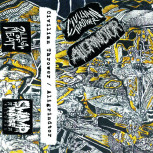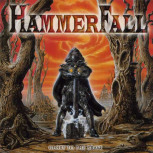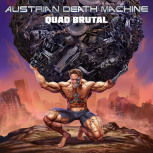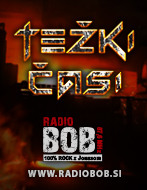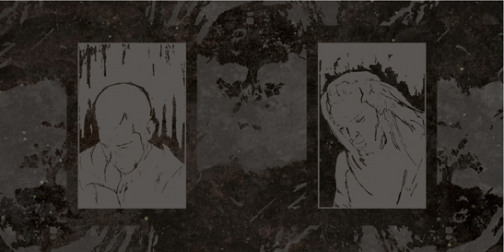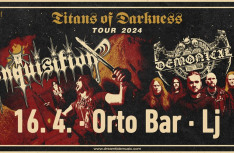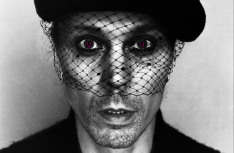This summer, the past five years seemingly dormant Canadian duo Gris released their third record À l'âme enflammée, l'äme constellée..., drawing evident parallels to film music. Shortly after Neptune and Icare then joined their close friend Annatar on Sombres Forêts' European tour, which was, sadly, not promoted enough but nonetheless turned out quite a success. Neptune now shared with us what impressions playing live on the other side of the Atlantic left on him and Icare, as well as a thing or two about the band in general and their latest record.
ALEKSANDRA: In essence, Gris has been an ongoing project for you since 2004. Have the two of you been friends for a long time already or did you meet because of a common goal; that is to create music?
NEPTUNE: Icare and I have been very close friends for more than twenty years now. We have grown together and have evolved in parallel. But we also think, on a more profound spiritual level, that we met because of a common goal. Creating music within Gris has been and will probably continue to be one of our main focuses and purposes together. It is what we are and do.
ALEKSANDRA: What made you change your band name? Was it because so many other bands took their names from Norse mythology or was there another reason behind it?
NEPTUNE: No, we didn't change our name because we thought too many bands used it, but for the simple reason that “Niflheim” didn't sufficiently represent what we artistically wanted to communicate and share with Gris. It wasn't large and vast enough. That's all.
ALEKSANDRA: Who wrote the lyrics for À l'âme enflammée, l'äme constellée... and are they the result of experience, a personal belief or something else?
NEPTUNE: I wrote the lyrics for “À l'Âme Enflammée, l'Äme Constellée...”, whereas Icare wrote most of the lyrics for “Il Était Une Forêt...”
ALEKSANDRA: Did you receive any formal musical education in the past? Which instrument do you consider as your primary one and do you play any other instruments that are not present on your releases? And how come there’s no piano on À l'âme enflammée, l'äme constellée...? Many of your listeners were surprised by this decision.
NEPTUNE: Icare did receive some musical education early on in life, from his family and from school, but we are mostly self-taught musicians, particularly when it comes to what we create with Gris. We do not play any other instruments that are not on our releases. The decision to not include piano on the most recent album was a conscious one we made – our intention is actually for piano to be a central element on the fourth album.
ALEKSANDRA: How does the song-writing process look like for you? Do you make new songs together in your studio or separately at home? Do you first write the music and then the lyrics or the other way around?
NEPTUNE: We always create our music together – for us, it is important to maintain equal collaboration in everything we do. We write the core of each track together, and from that point on, we both add elements and detailing with our respective instruments. We do not follow a specific order in the way we write – sometimes the lyrics inspire us to write the music, but the opposite can also happen. Occasionally, we will have the text and the music written separately, and we decide to pair them up.
ALEKSANDRA: The song Dil has a quite elaborate intro into the song that sounds much like something you’d expect to hear in a film soundtrack. Do you think you’d use it as an introductory piece if you ever decided to play live? And is there any composer who speaks to you in particular?
NEPTUNE: If ever we were to do a show, we would most likely not use part of a track, like Dil, to start things off. It would be important for us to play Dil as a whole. As an intro, we would most likely want to create something totally new, specifically for the purposes of the show. We do admire many composers, and film soundtracks are often a great source of inspiration.
ALEKSANDRA: How was it like for you to play with Sombres Forêts in Europe this summer? What are your favourite memories from the tour and would you like to do the same with Gris sometime in the future? I think you both did an impeccable job with bringing out the old and new SF songs on stage.
NEPTUNE: Thank you! The tour was an amazing experience that was very enriching for us from a musical point of view. It allowed us to meet new people that have a different take on music, and without the tour we never would have been able to expand our horizons in that way. At the same time, it was quite physically demanding, given the number of shows we played and the distance we had to cover between venues. In the future, we may do a show with Gris, but we would need to have many more musicians for the background vocals and violins, for example, so a tour may not be possible.
ALEKSANDRA: Which song from À l'âme enflammée... would you pick as your favourite and why? I personally can’t decide, because I keep rediscovering the songs every time I listen to the record over again. They’re all so detailed and each fit to a different mood, yet as a whole the album still flows perfectly.
NEPTUNE: Thank you so much! It’s hard for us to pick favourites, because as the composers and producers we look at the album as a whole – we created it based on how each element flowed into the others, so to isolate one track as “our favourite” is contrary to that logic. If we really had to pick one track that summarizes our intentions and the emotions we were trying to convey through this work, it would be “Une Épitaphe de Suie.”
ALEKSANDRA: Did you give Fursy Teyssier any directions on how the album cover should look like or did he have free hands at it? I think he did a marvellous job, especially with the details of the statue’s face cracking from the heat inside and with the constellations in the background.
NEPTUNE: We gave Fursy Teyssier an idea of how we saw the visuals of the album, but because he is the “expert” in that field, he had an important say in how the album art turned out in the end.
ALEKSANDRA: You’ve drifted in another and quite unexpected course with your latest record. Does this mean you’re simply experimenting with the limits within this or that genre or rather that you’re slowly, but steadily leaving Black Metal behind you?
NEPTUNE: A bit of both. We are moving away from traditional black metal, especially when it comes to music and instruments, but the “dark” and “mysterious” essence of black metal will always remain at the heart of Gris. We are trying to find new and less traditional ways of expressing that essence. Our objective is definitely to push the limits of the genre, so you can expect more of that on the albums to come.
ALEKSANDRA: I read in an interview that you plan to disband Gris after the sixth, seventh album respectively, to conclude this chapter of your life. In this sense, do you consider Neurasthénie as your first record, even though you released it under a different name? And does setting a deadline affect your work in the sense that it makes you push your abilities and ambitions?
NEPTUNE: Yes, Neurasténie is considered as the first of seven chapters for Gris. Even though it was a very rough and primitive album, it remains the source from which Gris sprang, without which we would not have evolved into our current direction. Setting a deadline to Gris does not limit us, but pushes us to consider the importance of each chapter and really establish what we want to accomplish through each one. In that way it does help bring greater depth to each album.
ALEKSANDRA: Annatar already shared his views on why he keeps his identity in the shadows. Why do you veil yourself from the public?
NEPTUNE: We do not reveal our identity, because it is important for us to keep the focus on the music, and to maintain some of the mystery that surrounds Gris.
ALEKSANDRA: Annatar also mentioned that you might revive Miserere Luminis. I read somewhere that during the ML concert at one point all of you swapped your instruments on stage. It got me thinking about how the whole making of the record must have looked like. Was it chaotic or more of a relief, since no one actually had a set role in the project?
NEPTUNE: The fact that no one had a set role in Miserere Luminis was not a source of chaos – it actually gave us an interesting form of artistic freedom that allowed us all to experiment and experience something different from what we were used to doing within our respective projects. In terms of the shows, this also added new dynamism and a refreshing perspective to our music.
ALEKSANDRA: Do you have any other plans already set for the future? I wish you all the best with whatever it holds out for you and thank you very much for your answers.
NEPTUNE: Thanks, it was our pleasure. Our plans are to continue on with Gris’ fourth album, and most likely, a second chapter to Miserere Luminis.





